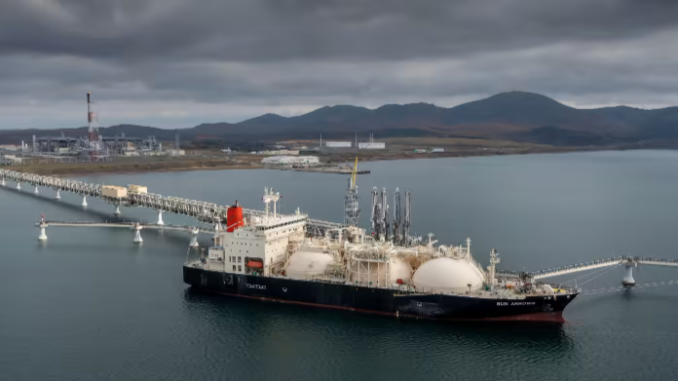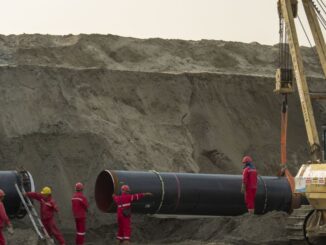
TOKYO — Russian President Vladimir Putin has ordered that the assets of Sakhalin-2, an oil and natural gas development project in Russia’s Far East, be transferred to a newly established Russian corporation without compensation.
The presidential order signed on Thursday has raised concerns in Japan that Mitsui & Co. and Mitsubishi Corp., the two Japanese participants in the project, may now be excluded from it.
The order calls for a limited liability company to be set up by the Russian side as the new operating entity. All assets, employees and rights of Sakhalin Energy, the current operator, which has received investment from Mitsui and Mitsubishi, will be transferred to the new entity.
Sakhalin Energy’s foreign shareholders can participate as shareholders in the new company, but only if they agree to the conditions of the Russian authorities. If they refuse, the Japanese trading companies could lose their investment in Sakhalin-2.
Russia’s state-owned gas company Gazprom owns about 50% of Sakhalin Energy, with 27.5%, 12.5% and 10% owned respectively by Shell, Mitsui and Mitsubishi. Sakhalin-2 produces about 10 million tons of liquefied natural gas per year, 6 million of which go to Japan. The project accounts for about 10% of Japan’s LNG imports.
“We can only say that we are in the process of confirming the facts,” Mitsui said on Friday morning of the move by the Russian government. Sakhalin-2 was still producing LNG as of June 30, and continues to export to Japan.
Japanese power companies and municipal gas companies have 10-year purchasing contracts with Sakhalin Energy. “Russia should want to keep its customers,” said one employee at a trading company. “Even if the Japanese companies are no longer shareholders, the long-term contracts will probably stay in place.” The change is unlikely to have an immediate impact on Japan’s LNG imports.
If the Japanese companies are excluded from Sakhalin-2, their revenue will be affected. Mitsui wrote off 80.6 billion yen ($594.9 million) in net assets, including LNG from Sakhalin-2, and impairment losses of 20.9 billion yen in the fiscal year ended March 2022. Mitsubishi also wrote off 50 billion yen related to Sakhalin-2. The possibility of additional impairments “depends on what happens with the contracts,” said the trading company employee.
Japanese Deputy Chief Cabinet Secretary Seiji Kihara said Friday the government was still examining the treatment of Japanese interests in the project and the impact on Japan’s imports of liquefied natural gas. “Our country’s interests in resources should not be hurt,” he told a regular news conference.
Meanwhile, Shell announced at the end of February that it would withdraw from Russian energy projects after Moscow began its invasion of Ukraine. According to reports, the company is negotiating with a consortium of Indian energy companies to sell its interests in Russia. Chinese energy companies are also said to have expressed interest in acquiring Shell’s business. Japanese trading companies, however, planned to continue to participate in the Sakhalin-2 as shareholders.
Some Japanese officials fear the worst. “It is possible that Russia will propose bad conditions in which it is difficult for Japanese companies to generate profits as they used to, or Russia will create laws or an environment in which Japanese companies are not comfortable to remain in the investment,” said one government official.
“This decree showed that Putin can change the law at any time at his own discretion,” the official warned. Potential bad conditions that could be proposed by Russia include reduced stakes or changes in the proportion of how stakeholders distribute profits, imposing additional financial burdens such as environmental tax, or other forms of tax, the source added.
“It is also possible that Russia will take similar measures to other oil and gas projects in the country such as Sakhalin-1 and Arctic LNG 2 in which Japanese companies have a stake,” the source said.
Another government official fears that “anything is possible.” Japanese utility companies usually have decade-long LNG procurement contracts with Sakhalin Energy until around 2030. If stakeholders of the Sakhalin project change, however, it is uncertain whether the new stakeholders will keep to these contracts, the official added.
Source: Nikkei.com



